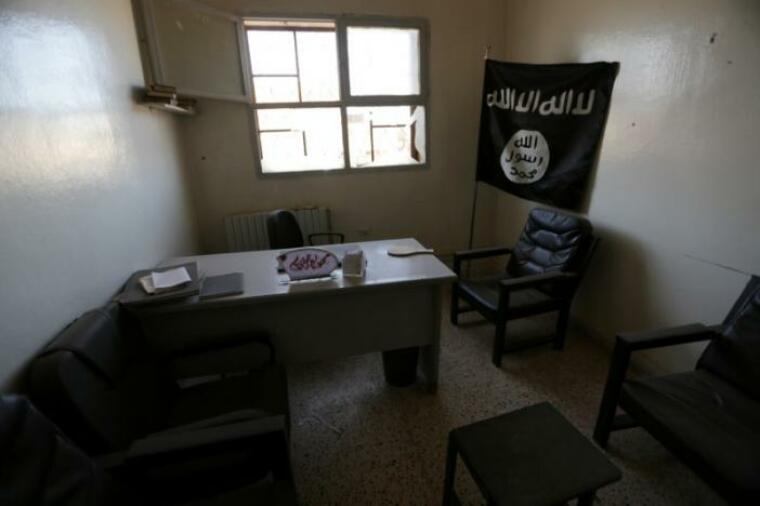ISIS warns supporters against downloading fake Islamic State magazines

The Islamic State has issued a warning to its supporters that fake versions of its publication are being circulated online.
ISIS announced that someone has published a fake 6th edition of Rumiyah online magazine and told its supporters to be careful where they download their copies, according to Heavy. The terror group described the perpetrators of the fake publication as "the kuffar," a broad, pejorative Islamic term meaning "disbeliever."
The latest edition of the magazine was issue #5, which was released in early January. The issue discussed the terroristic possibilities of arson and it specifically named First Baptist Dallas church in Texas as a target. In the November 2016 edition, ISIS described Macy's Thanksgiving Day Parade as "an excellent target" for a lone wolf attack.
While it is not known who is responsible for the fake publication, chatter on ISIS channels indicates suspicion towards intelligence agencies such as the CIA or the Federal Security Service of the Russian Federation (FSB).
This was not the first time ISIS warned its followers against fake publications. Last June, the terror group announced that there were fake versions of its official magazine, Dabiq, as well as the app for one its news agencies, Amaq.
"Brothers and sisters, We noticed that dubious attempts were made to spread a fake Dabiq magazine issue (claimed to be 'Issue 15', with two varying covers)," ISIS announced at the time.
"We would like to clarify that Al-Hayat Media Center has not yet released any new Dabiq issues. We advise you not to download this fake magazine for your own safety," it continued.
ISIS also warned its supporters against downloading the group's news app, Amaq Agency on Android, from unofficial channels, saying there is a fake version that is aimed at breaching security and spying.
Analysts have speculated that the fake versions were circulated by either government agencies or vigilante hackers as part of an effort to lure and track ISIS supporters online.
Amarnath Amarasingam, a fellow at the George Washington University Program on Extremism, noted that fake press releases and issues of Dabiq have been published in the past.
"Some people think it's a honeypot strategy by governments, maybe to learn about who clicks, who shares, who authenticates it as fake or real," Amarasingam said.
 Christians don't have to affirm transgenderism, but they can’t express that view at work: tribunal
Christians don't have to affirm transgenderism, but they can’t express that view at work: tribunal Archaeology discovery: Medieval Christian prayer beads found on Holy Island
Archaeology discovery: Medieval Christian prayer beads found on Holy Island Presbyterian Church in America votes to leave National Association of Evangelicals
Presbyterian Church in America votes to leave National Association of Evangelicals Over 50 killed in 'vile and satanic' attack at Nigerian church on Pentecost Sunday
Over 50 killed in 'vile and satanic' attack at Nigerian church on Pentecost Sunday Ukrainian Orthodox Church severs ties with Moscow over Patriarch Kirill's support for Putin's war
Ukrainian Orthodox Church severs ties with Moscow over Patriarch Kirill's support for Putin's war Islamic State kills 20 Nigerian Christians as revenge for US airstrike
Islamic State kills 20 Nigerian Christians as revenge for US airstrike Man who served 33 years in prison for murder leads inmates to Christ
Man who served 33 years in prison for murder leads inmates to Christ


 Nigerian student beaten to death, body burned over ‘blasphemous’ WhatsApp message
Nigerian student beaten to death, body burned over ‘blasphemous’ WhatsApp message 'A new low': World reacts after Hong Kong arrests 90-year-old Cardinal Joseph Zen
'A new low': World reacts after Hong Kong arrests 90-year-old Cardinal Joseph Zen Iran sentences Christian man to 10 years in prison for hosting house church worship gathering
Iran sentences Christian man to 10 years in prison for hosting house church worship gathering French Guyana: Pastor shot dead, church set on fire after meeting delegation of Evangelicals
French Guyana: Pastor shot dead, church set on fire after meeting delegation of Evangelicals ‘Talking Jesus’ report finds only 6% of UK adults identify as practicing Christians
‘Talking Jesus’ report finds only 6% of UK adults identify as practicing Christians Mission Eurasia ministry center blown up in Ukraine, hundreds of Bibles destroyed: 'God will provide'
Mission Eurasia ministry center blown up in Ukraine, hundreds of Bibles destroyed: 'God will provide' Church holds service for first time after ISIS desecrated it 8 years ago
Church holds service for first time after ISIS desecrated it 8 years ago Burger King apologizes for 'offensive campaign' using Jesus' words at the Last Supper
Burger King apologizes for 'offensive campaign' using Jesus' words at the Last Supper Uganda: Muslims abduct teacher, burn him inside mosque for praying in Christ’s name
Uganda: Muslims abduct teacher, burn him inside mosque for praying in Christ’s name